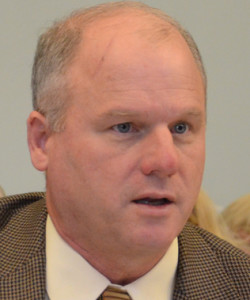
By Steve Brawner
© 2015 by Steve Brawner Communications, Inc.
Sixteen legislators will spend the next 22 months trying to figure out how to do what no one has been able to figure out so far – cost-effectively provide health care to lower-income people without growing government and making more people dependent upon it.
Also, they must try to produce a proposal that would be supported by 75 percent of the Legislature and the governor. Meanwhile, the Supreme Court this year will issue a ruling on Obamacare that could throw the entire health care system into disarray.
The group is called the Arkansas Health Care Reform Legislative Task Force. Tough task, huh?
The task force was created earlier this legislative session as Gov. Asa Hutchinson’s way of resolving the impasse over the private option. He doesn’t want it simply to go away without a replacement.
The private option was Arkansas’ response to the Affordable Care Act’s requirement that states expand their Medicaid populations, and the Supreme Court’s subsequent ruling that it had to be only optional. Many Republican-leaning states turned down federal money rather than grow Medicaid. Arkansas used that money to buy private insurance for 200,000 people, and counting.
Now Arkansas is leading the nation in the reduction of its uninsured population. According to a recent Gallup poll, the percentage of Arkansans without insurance dropped in one year from 22.5 to 11.4 percent. The private option will bring $1.3 billion in federal funds to the state in 2015. Without it, rural hospitals would probably close, as they have in states that turned down the money.
But the private option is rightfully controversial. It has roots in Obamacare. While the federal government is paying for almost all of it now, the state’s share grows over time – supposedly to 10 percent, but who knows with the federal government these days? Legislative opponents say this is how the $18 trillion national debt keeps growing. Everyone always has a hand out.
Because the private option involves spending money, it must pass with 75 percent majorities each year, and it’s barely done that twice. This year did not look promising, so Hutchinson asked legislators to form the task force to consider not only how to change (and surely rename) the private option, but also to consider broader Medicaid reforms.
The 16-member task force by design is split between legislators who have consistently voted for and against it. If this were Washington, it would accomplish nothing, but Little Rock is not Washington. The sponsor of the legislation creating the task force, Sen. Jim Hendren, R-Sulphur Springs, expects it to make progress “because we’re going to act like grown-ups.”
Hendren has been a private option opponent because he believes it’s unsustainable at both the state and federal levels. However, he recognizes that the old system – lots of uninsured people getting charity care in emergency rooms – wasn’t working. Plus, you can’t just yank insurance away from 200,000 people. Plus, he’s Hutchinson’s nephew. So what now? Ideally, he said, the task force will create something that will “meet the needs of those people that need it and encourage them to improve their station in life, and we also do it in a financially sustainable way.”
For many reasons, the culture in Little Rock is much more collaborative than in Washington, D.C. Unlike in our nation’s capital, state legislators tend to meet somewhere in the middle. Moreover, the lines between private option supporters and opponents can be somewhat blurred, Hendren said. “Obviously we’re not going to have a society in Arkansas where people can’t get health care at all. It’s just a question of how we deliver that in an affordable way,” he said.
The task force’s other Senate members are Sens. David Sanders, R-Little Rock; Jason Rapert, R-Conway; Linda Chesterfield, D-Little Rock; Keith Ingram, D-West Memphis; Terry Rice, R-Waldron; John Cooper, R-Jonesboro; and Cecile Bledsoe, R-Rogers. House members are Reps. David Meeks, R-Conway; Joe Farrer, R-Austin; Justin Boyd, R-Fort Smith; Michelle Gray, R-Melbourne; Charlie Collins, R-Fayetteville; David Murdock, D-Marianna; Deborah Ferguson, D-West Memphis; and Kim Hammer, R-Benton.
They must produce their first report by the end of the year. They won’t “solve” health care, but they will produce something useful. No one will get everything they want, and they’ll accept that, like grown-ups.
Bay Mountain Capital offers short term financing solutions throughout Texas to opportunistic residential real estate investors.